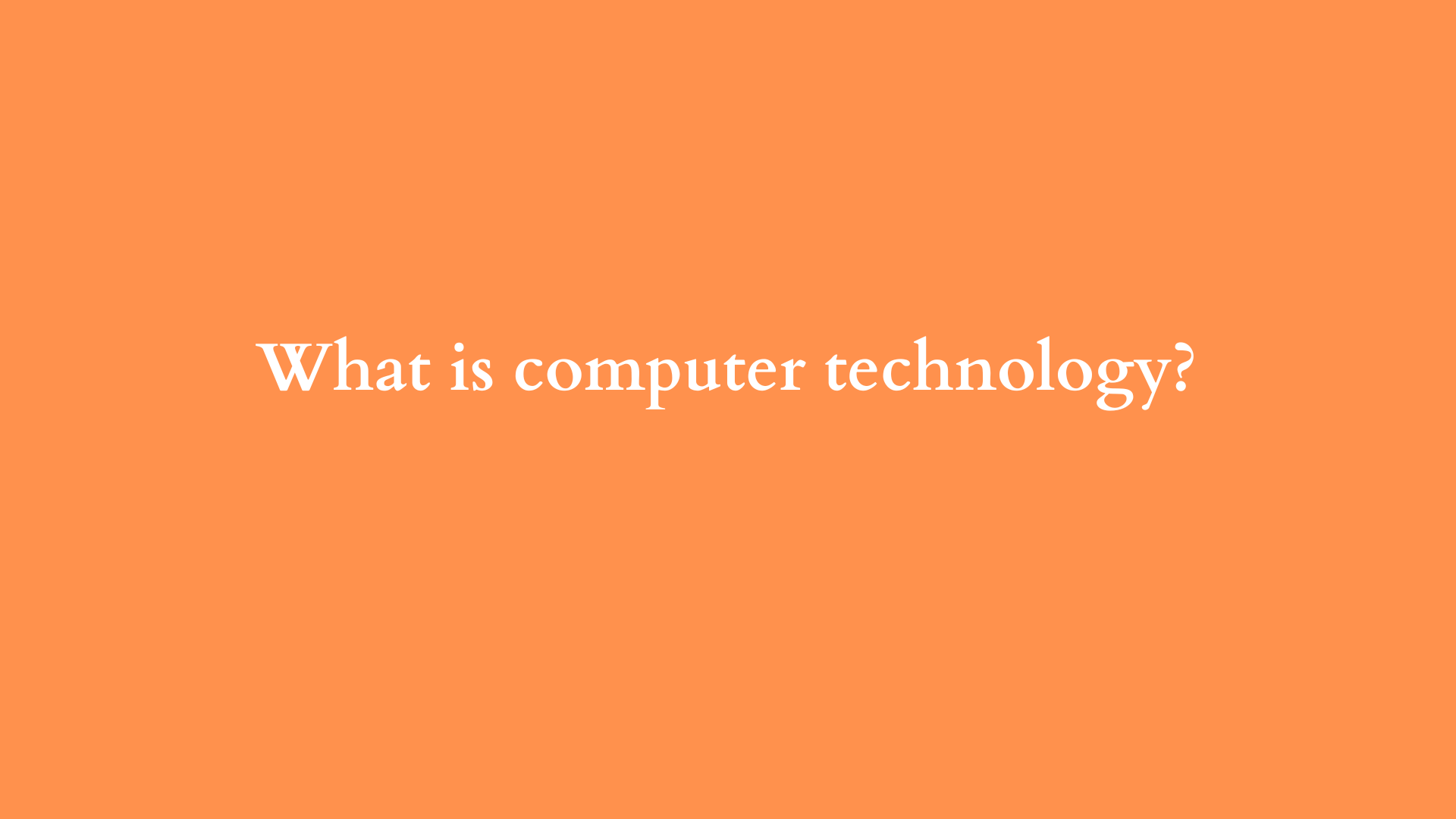Understanding Computer Technology: A Comprehensive Overview
In today’s fast-paced, digitally-driven world, computer technology plays an integral role in transforming how individuals and organizations operate. From simple calculations to complex machine learning algorithms, the breadth of computer technology has expansive implications across various sectors including education, healthcare, finance, and entertainment. As we delve deeper into the essence of computer technology, it becomes apparent that its influence is omnipresent and profoundly significant.

Defining Computer Technology
To understand computer technology, we must first define it in a broad context. Computer technology refers to the equipment, software, systems, and processes that contribute to the creation, manipulation, storage, transmission, and utilization of data. While it often evokes images of sleek laptops and mobile devices, the reality is much more intricate.
At its core, computer technology encompasses both hardware and software components. Hardware refers to the physical devices—such as computers, servers, and peripherals—while software includes the programs and applications that enable hardware to perform a wide range of tasks. Together, these components work in concert to process information, solve problems, and facilitate communication.
The Evolution of Computer Technology
The journey of computer technology has been marked by continuous innovation, starting from the early mechanical calculators of the 17th century to the advanced quantum computing systems of today. Here are key milestones in this evolution:
1. Early Computational Devices
The history of computing can be traced back to ancient devices like the abacus, which revolutionized numerical calculations. In the 17th century, mechanical calculators emerged, enabling more complex arithmetic operations through gears and levers.
2. The Birth of Electronic Computers
The introduction of electronic computers in the mid-20th century marked a seismic shift in computational capabilities. Devices like the ENIAC paved the way for the development of programmable computers, allowing for versatile applications beyond mere calculation.
3. The Era of Personal Computers
The late 1970s and early 1980s saw the arrival of personal computers (PCs) that revolutionized individual and household computing. Companies like IBM and Apple played pivotal roles in making computing accessible to the general populace, thus democratizing information technology.
4. The Internet Explosion
The advent of the internet in the 1990s transformed computer technology, facilitating unprecedented connectivity and access to information. It served as the backbone for e-commerce, social media, and online education, fundamentally altering how we communicate, learn, and conduct business.
5. The Mobile Computing Revolution
As smartphone technology matured in the 2000s, the landscape of computer technology underwent yet another transformation. Mobile devices equipped with powerful processors and internet connectivity put the capabilities of computers in the palm of our hands, resulting in an always-connected society.
6. Artificial Intelligence and Machine Learning
The emergence of artificial intelligence (AI) and machine learning in the 21st century represents the latest chapter in computer technology’s evolution. These advancements empower computers to analyze vast amounts of data, make predictions, and even learn from experiences, leading to innovations in diverse fields such as healthcare diagnostics, autonomous vehicles, and smart home systems.
Core Components of Computer Technology
To delve deeper into the essence of computer technology, let’s explore its core components:
1. Hardware
Hardware consists of several essential components:
- Central Processing Unit (CPU): Often referred to as the brain of the computer, the CPU executes instructions and processes data.
- Memory: This includes Random Access Memory (RAM) for temporary data storage and storage devices like hard disks and solid-state drives for long-term data retention.
- Input/Output Devices: Keyboards, mice, monitors, printers, and speakers all fall under this category, enabling users to interact with the computer and receive feedback.
2. Software
Software can be categorized into two primary types:
- System Software: This includes operating systems (like Windows, macOS, and Linux) that manage hardware resources and provide a platform for running applications.
- Application Software: These are programs designed to perform specific tasks, such as word processing, spreadsheet analysis, and graphic design.
3. Networks
Computer networks are integral to today’s digital landscape, allowing multiple devices to communicate and share resources. The internet serves as the largest network, while local area networks (LANs) connect devices within a specific geographic area. Networking protocols ensure data is transmitted reliably and securely across these connections.
4. Data Management
Data is the lifeblood of computer technology. Big data, databases, and data analysis tools enable organizations to extract actionable insights from large datasets. As data continues to grow exponentially, effective data management has become a key focal point for organizations aiming to harness its potential.
The Impact of Computer Technology on Society
The implications of computer technology extend far beyond mere functionality. It has reshaped societal structures, influenced economic models, and transformed individual lifestyles. Here are several areas where computer technology has had profound effects:
1. Education
From online learning platforms to interactive textbooks, computer technology has revolutionized education. Students now have access to vast resources, learning management systems, and virtual classrooms, breaking geographical barriers and offering flexible learning opportunities. The rise of Massive Open Online Courses (MOOCs) has made quality education accessible to individuals regardless of their location or socioeconomic status.
2. Healthcare
In the healthcare sector, computer technology has facilitated advancements such as electronic health records, telemedicine, and predictive analytics. Sophisticated algorithms can analyze patient data to predict outcomes, enabling more effective treatment plans and improving patient care. Moreover, wearable technology has empowered individuals to monitor their health regularly, promoting preventative care.
3. Business and E-commerce
The business landscape has been dramatically transformed by computer technology. E-commerce platforms have created new business models and opportunities, allowing companies to reach global markets. Customer relationship management (CRM) systems and data analytics provide businesses with insights into consumer behavior, enabling them to tailor their products and marketing strategies effectively.
4. Entertainment
The entertainment industry has witnessed a significant transformation driven by computer technology. Streaming services, online gaming, and virtual reality are reshaping how consumers engage with media. Computer-generated imagery (CGI) has revolutionized the film industry, creating visually stunning experiences that were once unimaginable.
5. Communication
Computer technology has transformed communication, making it instantaneous and more accessible than ever. Social media platforms, video conferencing tools, and instant messaging applications have fostered a global dialogue, breaking down cultural and geographic barriers.
Future Trends in Computer Technology
As we look ahead, several trends will likely shape the future of computer technology:
1. Quantum Computing
Quantum computing holds the promise of revolutionizing data processing by leveraging the principles of quantum mechanics. With the potential to solve complex problems beyond the reach of classical computers, quantum technology could impact fields like cryptography, materials science, and optimization.
2. Artificial Intelligence
The integration of AI across various sectors is expected to deepen. As machine learning evolves, its applications will range from more sophisticated automation in manufacturing to advanced personalized medicine in healthcare.
3. The Internet of Things (IoT)
The IoT refers to the interconnectedness of everyday devices through the internet. As smart towns and cities become a reality, the ability to gather and analyze data from millions of devices will lead to greater efficiency and improved quality of life.
4. Cybersecurity
With the increasing reliance on technology comes the paramount importance of cybersecurity. Protecting sensitive information from cyber threats will remain a critical focus for individuals and organizations alike, leading to advancements in secure technology development.
5. Augmented and Virtual Reality
AR and VR technology are poised to redefine both entertainment and practical applications, such as training simulations, remote collaboration, and immersive educational experiences.
Shop Now






